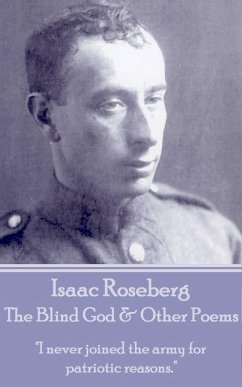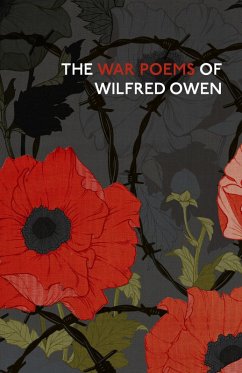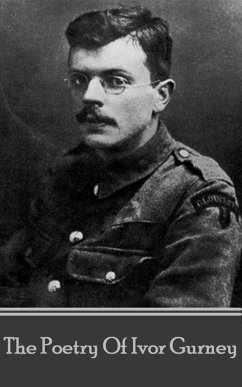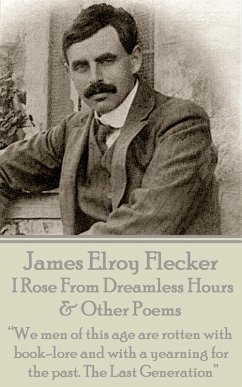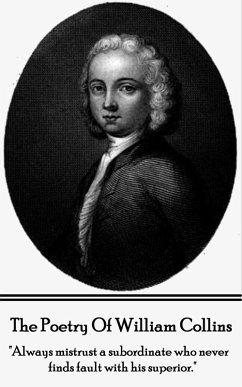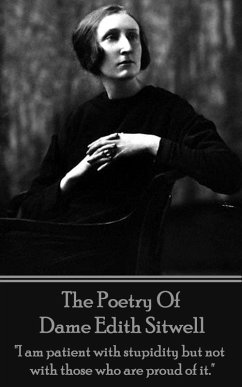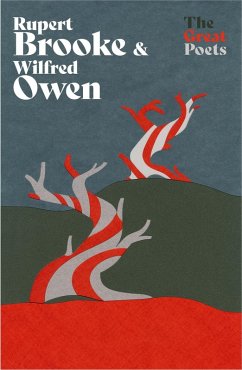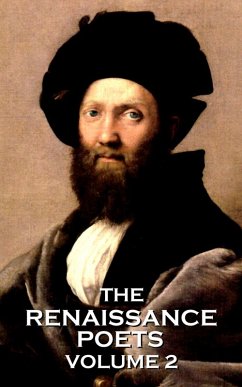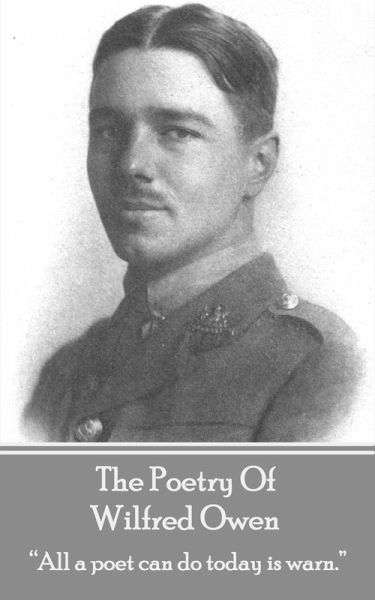
The Poetry Of Wilfred Owen (eBook, ePUB)
"All a poet can do today is warn."

PAYBACK Punkte
1 °P sammeln!
By 1909 Wilfred was a pupil-teacher at the Wyle Cop school in Shrewsbury and two year later he passed the matriculation exam for the University of London. Unfortunately first class honours were required for a scholarship and this he did not achieve, which meant he was not eligible for a scholarship. The family finances were such that that was the only way he could have afforded attended. Wilfred now needed to complete his education by a different route. In return for free lodging, Wilfred worked as lay assistant to the Vicar of Dunsden near Reading. He also attended classes at University Colle...
By 1909 Wilfred was a pupil-teacher at the Wyle Cop school in Shrewsbury and two year later he passed the matriculation exam for the University of London. Unfortunately first class honours were required for a scholarship and this he did not achieve, which meant he was not eligible for a scholarship. The family finances were such that that was the only way he could have afforded attended. Wilfred now needed to complete his education by a different route. In return for free lodging, Wilfred worked as lay assistant to the Vicar of Dunsden near Reading. He also attended classes at University College, Reading, in botany and later lessons in Old English. The time spent at Dunsden parish led him to become disillusioned with the Church, both in its ceremony and its failure to provide aid for those most in need. In 1913 Wilfred began work as a private tutor teaching English and French at the Berlitz School of Languages in Bordeaux, France, and then later in July 1914 with a Catholic family as a tutor to their two boys. It was there he met the older French poet Laurent Tailhade, with whom he was to later correspond in French. With the dark shadows of war beginning to envelop Europe many of his contemporaries prepared for a future fighting in the Services. But with the outbreak of war Wilfred did not rush to enlist - it is said he even considered enlisting with the French army but he did return to England. On 21 October 1915, Wilfred finally joined up and enlisted with the Artists' Rifles Officers' Training Corps. For the next seven months, he trained at Hare Hall Camp in Essex. On 4 June 1916 he was commissioned as a second lieutenant in the Manchester Regiment. Initially, he was discouraged by his troop's behaviour, holding them in contempt for their loutish ways. Writing to his Mother he described them as "expressionless lumps". The War now was to change his life dramatically in a series of sharp, traumatic shocks; he fell into a shell hole and suffered concussion; he was blown high into the air by a trench mortar, and spent several days lying out on an embankment in Savy Wood amongst (he thought) the remnants of a fellow officer. Soon afterwards, Owen was diagnosed as suffering from neurasthenia or shell shock and sent to Craiglockhart War Hospital in Edinburgh for treatment. It was while recuperating here that he met and befriended fellow poet Siegfried Sassoon. This encounter was to again transform his young life. Whilst undergoing treatment he made several friendships in the Edinburgh artistic set. Wilfred also did some teaching at Tynecastle High School, a poor area of the city. In November he was discharged from Craiglockhart and judged fit for light regimental duties. He spent a contented and fruitful winter in Scarborough, and in March 1918 was posted to the Northern Command Depot at Ripon where he composed a number of his poems, including "Futility" and "Strange Meeting". His last birthday, his 25th, was spent quietly at Ripon Cathedral, which is, by coincidence, dedicated to his namesake, St. Wilfrid of Hexham. At the height of summer 1918 Owen returned to active service, although he might have stayed on home-duty indefinitely. this decision was probably, or at least partly, the result of Siegfried Sassoon's being sent back to England, after being shot in the head in an apparent "friendly fire" incident, and put on sick-leave for the remaining duration of the war. Wilfred saw it as his duty to add his voice to that of Sassoon, that the horrific realities and tragedy of war must continue to be told from the vantage point of the front line. Sassoon was violently opposed to the idea of Owen returning to the trenches, threatening to "stab him in the leg" if he did. Aware of his friend's attitude, Owen did not inform him of his action until he was once again in France. On 1 October 1918 Owen led units of the Second Manchesters to storm a number of enemy strong points near the village of Joncourt. For his courage and leadership in the Joncourt action, he was awarded the Military Cross, an award he had always sought in order to justify himself as a war poet, but the award was not gazetted until 15 February 1919. The citation followed on 30 July 1919: 2nd Lt, Wilfred Edward Salter Owen, 5th Bn. Manch. R., T.F., attd. 2nd Bn. For conspicuous gallantry and devotion to duty in the attack on the Fonsomme Line on October 1st/2nd, 1918. On the company commander becoming a casualty, he assumed command and showed fine leadership and resisted a heavy counter-attack. He personally manipulated a captured enemy machine gun from an isolated position and inflicted considerable losses on the enemy. Throughout he behaved most gallantly. With his poetry and bravery not now in question Wilfred continued to fight and relate his experiences. Germany was now struggling to contain the Allies advance and the end of the war was now in sight. However for Wilfred he would not live to see Europe at peace. He was killed in action on 4 November 1918 during the crossing of the Sambre-Oise Canal, one week before the signing of the Armistice. He was promoted to the rank of Lieutenant the day after his death. His mother received the telegram informing her son's death on November 11th, Armistice Day, as the church bells were ringing out the end of hostilities. Wilfred Owen is buried at Ors Communal Cemetery. Today Wilfred Owen is judged to be the finest of the World War I poets. His synthesis of his early romanticism together with the gritty realism encouraged by Sassoon and others create a remarkably moving and vivid description of what soldiers endured in service of their country.
Dieser Download kann aus rechtlichen Gründen nur mit Rechnungsadresse in D ausgeliefert werden.




